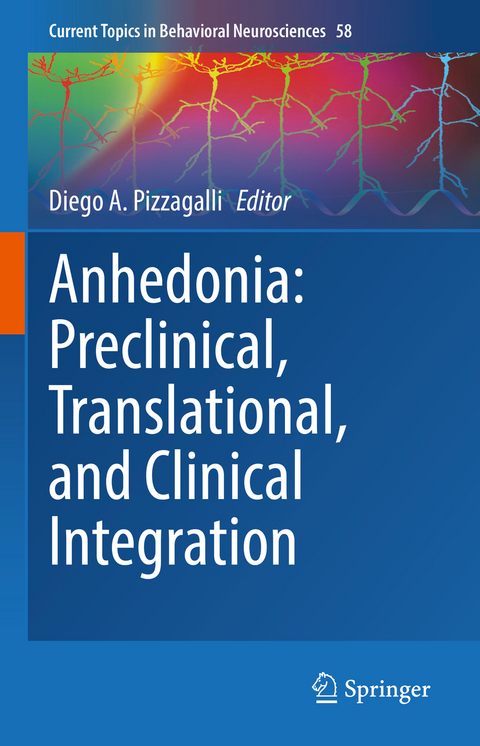
Anhedonia: Preclinical, Translational, and Clinical Integration
Springer International Publishing (Verlag)
978-3-031-09682-2 (ISBN)
Anhedonia is a key symptom (and often risk factor) for various neuropsychiatric disorders, including depression, schizophrenia, substance use disorders, post-traumatic stress disorders, and Parkinson's Disease, among others. Across disorders, anhedonia has been associated with worse disease course, including poor response to pharmacological, psychological and neurostimulation treatments as well as completed suicide. Mounting evidence emerging from preclinical and translational sciences has clarified that "anhedonia" can be parsed into partially independent subcomponents, including incentive motivation, consummatory pleasure, reward learning, and effort-based decision making, pointing to distinct neurobiological substrates that could underlie anhedonic phenotypes. Taking an integrative approach that emphasizes cross-species integration and dimensional conceptualization of mental illnesses (e.g., Research Domain Criteria (RDoC)), this book represents the most comprehensive evaluation,synthesis and integration of theories and empirical findings focused on anhedonia.
Organized across five parts, the handbook starts with chapters on the history, etiology, and assessments of anhedonia (Part I), followed by a section on the role of anhedonia in psychiatric and neurological disorders (Part II). Using the RDoC Matrix as a guide, Part III presents chapters synthetizing preclinical and clinical findings on different reward processing subdomains (e.g., reward responsiveness, reward valuation, reward learning). Part IV is focused on selected special topics, including historical and current perspectives on the transdiagnostic nature and importance of social anhedonia, the role of inflammation in the pathophysiology of anhedonia, the use of computational modeling to "dissect" anhedonia and improve its understanding, and links between anhedonia and suicide. Finally, Part V includes chapters on pharmacological, psychological and neurostimulation treatments for anhedonia.
Section I. Anhedonia - History, Etiology, and Assessments.- 1. Historical Perspective.- 2. Clinical and Behavioral Assessments.- 3. Developmental Trajectories: Preclinical.- 4. Developmental Trajectories: Clinical.- 5. Genetics Contributions.- 6. Environmental Contributions.- Section II. Anhedonia in Psychiatric and Neurological Disorders.- 7. Depression and Bipolar Disorder.- 8. Schizophrenia.- 9. Substance Use Disorder.- 10. Nicotine Dependence.- 11. Posttraumatic Stress Disorder.- 12. Anxiety.- 13. Eating Disorders.- 14. Autism and Developmental Disorders.- 15. Neurodegenerative Disorders.- Section III. Reward Processing Systems in Anhedonia.- Reward Responsiveness.- 16. Pleasure.- 17. Anticipation.- Reward Valuation.- 18. Reward Value - Delay and Reward Magnitude.- 19. Effort/Motivation.- Reward Learning.- 20. Reward Prediction Error.- 21. Probabilistic and Reinforcement Learning.- Section IV. Treatments.- 22. Pharmacological Treatments for Anhedonia.- 23. Psychological Treatments for Anhedonia.- 24. Neurostimulation.- Section V. Special Topics.- 25. Inflammation and Anhedonia.- 26. Computational Modeling of Anhedonia.- 27. Anhedonia and Suicide.
| Erscheinungsdatum | 11.08.2022 |
|---|---|
| Reihe/Serie | Current Topics in Behavioral Neurosciences |
| Zusatzinfo | XI, 535 p. 1 illus. |
| Verlagsort | Cham |
| Sprache | englisch |
| Maße | 155 x 235 mm |
| Gewicht | 979 g |
| Themenwelt | Medizin / Pharmazie ► Medizinische Fachgebiete ► Psychiatrie / Psychotherapie |
| Medizin / Pharmazie ► Studium | |
| Naturwissenschaften ► Biologie ► Humanbiologie | |
| Naturwissenschaften ► Biologie ► Zoologie | |
| Schlagworte | Anhedonia • Animal Models • Motivation • Pleasure • RDoC • Reward Processing |
| ISBN-10 | 3-031-09682-7 / 3031096827 |
| ISBN-13 | 978-3-031-09682-2 / 9783031096822 |
| Zustand | Neuware |
| Haben Sie eine Frage zum Produkt? |
aus dem Bereich


